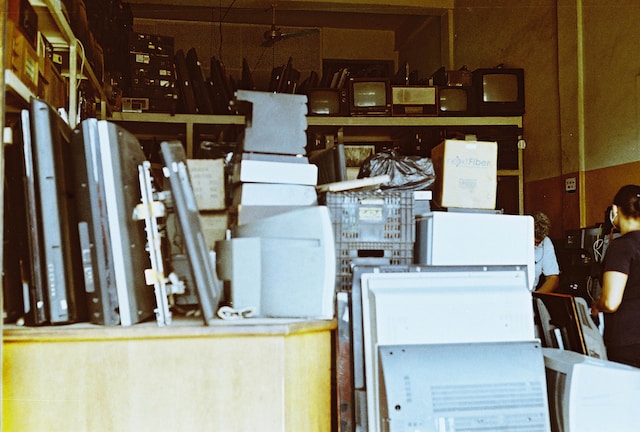Most electronics, including cell phones, computers, printers, scanners and televisions, can be recycled. However, a few types, like old cathode ray tube televisions and monitors, contain toxic materials that require special handling as hazardous waste. Electronics recycling helps protect the environment from harmful chemicals and metals leaching into soil or water. It also protects privacy by properly destroying any private data stored on the equipment before recycling.
Recycling Options
Most electronics, including cell phones, tablets, computers, printers, TVs and cameras, can be recycled. Some, like old cathode ray tube televisions and monitors, require special treatment because they contain toxic elements such as lead, mercury and beryllium. Computer recycling focuses on extracting the valuable raw materials that make up these devices, allowing them to be reused in new products. Recycle all electronic equipment by local, state and federal guidelines, regulations and laws governing the collection, transportation and processing of e-waste. It is the most environmentally friendly choice and can help keep harmful elements like lead, mercury, and other metals out of the waste stream and the environment. Beware of companies that offer to recycle electronics for free but end up exporting them to developing countries to be “recycled.” In these foreign junkyards, workers take apart and burn the devices to access the metals inside, exposing themselves to toxic substances over long periods.
Take-Back Programs
The easiest and most sustainable way to get rid of old electronics is to recycle them. Almost all common electronic devices, including cell phones, computers, laptops, printers and scanners, televisions, cameras, power tools and appliances, can be recycled. The exceptions are anything that contains mercury or lead (pre-1991 cathode ray tubes) and certain types of electrical machinery.
Depending on the manufacturer, some take-back programs may require original packaging or receipts to qualify for recycling. It can be inconvenient, especially for businesses with large quantities of obsolete equipment to dispose of. Independent recyclers can offer transportation services and onsite de-installation to make the process as simple as possible.
E-waste is the fastest-growing waste stream globally, driven by technological advancements and shortened lifespans of devices. When discarded improperly, these devices can release toxic substances like mercury, arsenic and cadmium into the environment. Electronic recycling recovers these materials, allowing them to be reused in new devices. It also ensures that private data is properly erased, preventing breaches and security violations.
Disposal Options
Many businesses use a variety of electronics to operate, from cell phones and computers to printers, scanners, cameras and power tools. Almost all of these devices are recyclable, except for some old cathode-ray tube televisions and monitors containing mercury and certain appliances requiring special disposal as hazardous waste. Recovering valuable materials from e-waste, like metals and polymers, allows for producing new electronic products. It also reduces the need for raw materials extracted from the environment and minimizes environmental risks and hazards associated with mining these materials. As a business, you have several options for recycling obsolete electronics, from participating in manufacturer-sponsored take-back programs to donating them to local charities and non-profits or participating in municipal e-waste events. However, before you recycle your electronics, ensure they don’t contain sensitive data that could be compromised if disposed of improperly.
Recycling Efficacy
Electronic waste (e-waste) is the fastest-growing waste stream globally due to our shortening device lifespans and our desire for the latest high-tech products. E-waste can contain hazardous chemicals and materials and release toxins into the environment if improperly disposed of. Most office electronics like desktop computers, cell phones, printers and televisions are easily recyclable. In contrast, others, such as power tools, lamps or refrigerators, may require special handling as they might contain hazardous substances like mercury or lead. Generally, recycling is the most appropriate way to dispose of these items as it helps protect our planet from toxic properties that can end up in landfills, leaching into soil and water. Reputable recyclers will shred and break down all e-waste, reusing or selling any functional parts to other manufacturers to produce new devices. They will then sort the remaining components into different categories based on their metal content. From here, they will run them through a mechanical shredding process that separates the various metals and sends them to be melted down into new materials.





Leave a Reply